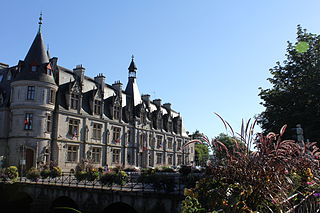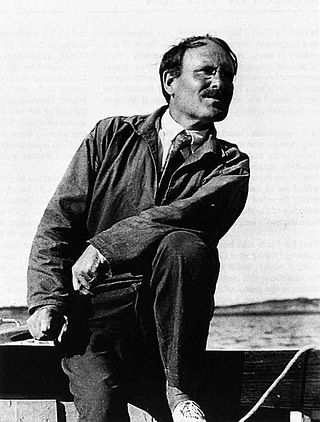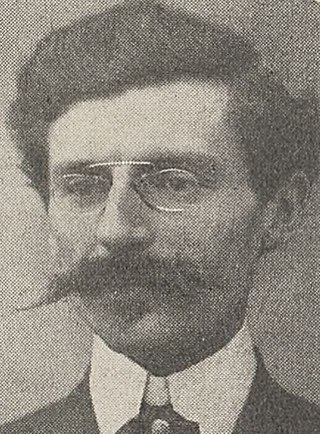
Brittany is a peninsula, historical country and cultural area in the north-west of modern France, covering the western part of what was known as Armorica during the period of Roman occupation. It became an independent kingdom and then a duchy before being united with the Kingdom of France in 1532 as a province governed as a separate nation under the crown. Brittany is the traditional homeland of the Breton people and is one of the six Celtic nations, retaining a distinct cultural identity that reflects its history.

Brest is a port city in the Finistère department, Brittany. Located in a sheltered bay not far from the western tip of a peninsula and the western extremity of metropolitan France, Brest is an important harbour and the second largest French military port after Toulon. The city is located on the western edge of continental France. With 139,456 inhabitants (2020), Brest forms Western Brittany's largest metropolitan area, ranking third behind only Nantes and Rennes in the whole of historic Brittany, and the 25th most populous city in France (2019); moreover, Brest provides services to the one million inhabitants of Western Brittany. Although Brest is by far the largest city in Finistère, the préfecture of the department is in the much smaller town of Quimper.

Finistère is a department of France in the extreme west of Brittany. Its prefecture is Quimper and its largest city is Brest. In 2019, it had a population of 915,090.

Marie-Paul Achille Auguste Le Flem was a French composer and music critic.

Joseph Guy Marie Ropartz was a French composer and conductor. His compositions included five symphonies, three violin sonatas, cello sonatas, six string quartets, a piano trio and string trio, stage works, a number of choral works and other music, often alluding to his Breton heritage. Ropartz also published poetry.

Morlaix is a commune in the Finistère department of Brittany in northwestern France. It is a sub-prefecture of the department.
Émile Desportes was a French composer and conductor. He was the father of composer Yvonne Desportes (1907–93).

Louis François Marie Aubert was a French composer.

Landerneau is a commune in the Finistère department of Brittany in north-western France.
Maurice Duhamel was the pen-name of Maurice Bourgeaux, a Breton musician, writer and activist who was a leading figure in Breton nationalism and federalist politics in the years before World War II.

Paul Émile Ladmirault was a French composer and music critic whose music expressed his devotion to Brittany. Claude Debussy wrote that his work possessed a "fine dreamy musicality", commenting on its characteristically hesitant character by suggesting that it sounded as if it was "afraid of expressing itself too much". Florent Schmitt said of him: "Of all the musicians of his generation, he was perhaps the most talented, most original, but also the most modest". Peter Warlock dedicated his Capriol Suite to him and Swan Hennessy his Trio, Op. 54.
René Abjean is a French composer associated with Breton revivalist choral music.

Alexandre Édouard Goria was a French virtuoso pianist and composer recognised among amateurs enthusiasts for his numerous salon pieces of different styles, which enjoyed great success at their time. The number of fancy arrangements and transcriptions by Goria of selected motifs from great operas proves the composer's great facility and the popularity of his name, which had commercial value. He was a favorite artist of lovers of brilliant music, concert and salon music.
Éric Breton is a French composer. Since 1994, he has made several compositions for the Sarajevo Philharmonic Orchestra.
Selma Mutal is a Franco-Dutch film score composer. She is known for her collaborations with filmmakers Claudia Llosa, Javier Fuentes-León, and Tod Lending. Mutal has also scored films directed by Fabien Gorgeart, Piotr Dumala, Pola Rapaport, and Víctor García León, work for TV, and a Chanel campaign, among other things.
Robin Coudert, also known by his stage name ROB, is a French pop/rock musician, singer-songwriter, producer and film score composer.
Léon de Saint-Réquier, born Léon-Edgard de Saint-Réquier viscount of Saint-Réquier, was a French organist, composer, choir conductor, maître de chapelle and music educator.
Louis Vuillemin was a French composer and music critic who strongly identified with his Breton heritage in his music.
Edgar Bischoff, also known by the alias Francis Mainville, was a Romanian-born French composer and lyricist.
Henri Moreau was a composer and teacher born in Liège in what is now modern-day Belgium. He studied with Bartolomeo Lustrini and Antonio Aurisicchio and he is known to have taught André Ernest Modeste Grétry. Moreau composed religious works which were never printed but would have included Christmas carols popular at the time in Liège. Moreau wrote a number of instrumental works, for example 6 trios, which are known to have been written in Liège around 1777 but were subsequently lost.










